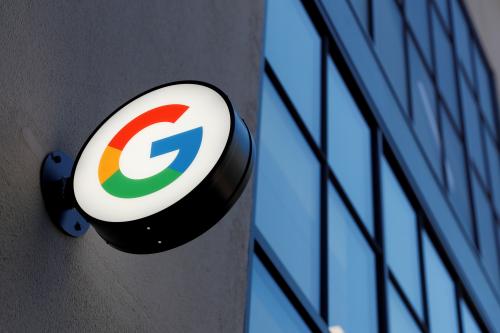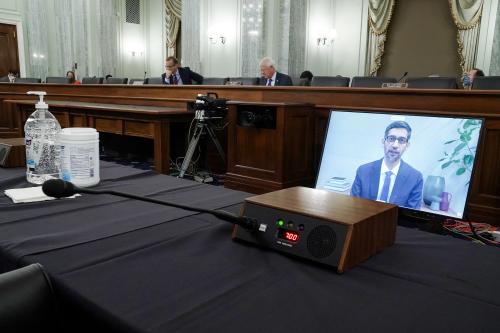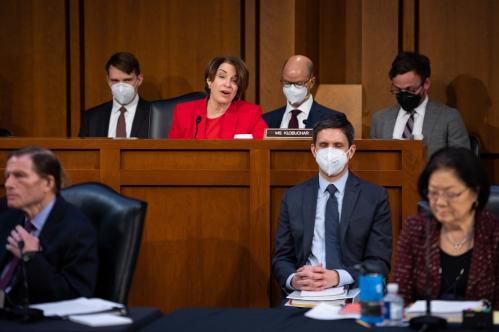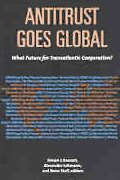Late last year, the Federal Trade Commission and 48 attorneys general released their antitrust complaints against Facebook. As they see it, Facebook became the most popular social media platform by offering innovative features and privacy protections far more attractive than early competitors like Myspace. But to maintain its resulting dominance, the company turned to unfair means of competition—buying budding rivals like Instagram and WhatsApp and refusing to supply other rivals with essential inputs to build their alternative systems. The agencies want to force Facebook to spin off these companies into independent competitors.
The hope, as The Economist put it, is to move beyond “narrow competition law” and do something about “Facebook’s privacy practices, the spread of fake news and conspiracy theories on the platform, and its exploitation by authoritarian regimes.” Indeed, if Facebook used its monopoly position to “degrade privacy protections for millions of Americans” as New York State Attorney General Leticia James put it, it is logical to expect that restoring competition will restore the lost privacy protections.
But this would expect too much from cases based on “narrow competition law.” The likely result of the proposed divestitures will be more choice and lower prices for advertisers, but not improved privacy and better content moderation for users.
An independent WhatsApp will be in the business of instant messaging, competing with free messaging services offered by Apple, Google, and Facebook itself. A spun-off Instagram will be a mobile photo-sharing app, competing primarily with the free services of SnapChat and TikTok. They will face fierce competition in these businesses, only now without access to Facebook’s marketing support, user data, and most especially without Facebook’s powerful algorithms that can generate engagement and personalize advertising.
Crucially, these companies will continue to fund their businesses through advertising. As the House Antitrust Committee’s report on digital markets noted, online markets are the site of ruthless competition for user data to cater to the insatiable appetite of advertisers for ever-more targeted messages. Other revenue models exist, but they all depend on charging the user, an enormously risky bet for newly spun-off companies competing with free alternatives. No one should expect a spun-off WhatsApp to revert to the privacy-friendly, advertising-adverse start-up it was a decade ago.
The need to please advertisers will inevitably frustrate the widespread expectation that a Facebook breakup will lead to better privacy protections for users. True, there will be a one-time benefit for user privacy as Facebook’s integrated data base is ripped apart into separate profiles of WhatsApp, Instagram, and Facebook users. But each of these companies will rapidly rebuild their user profiles with new data and continue their efforts to exploit this data to personalize services and advertising.
This will be a boon for advertisers. Many of them, especially small and medium sized businesses and news publishers, are heavily dependent on Facebook to reach their customers, and they pay a premium for these advertising services. With Instagram and WhatsApp as two newly independent advertising outlets, they can expect a broader range of choices and some decrease in ad prices.
These traditional benefits of antitrust action are substantial and perhaps should be complemented with new mandates and tools to promote competition in digital markets, as recommended in the recent Shorenstein Center report.
But if reinvigorated antitrust enforcement does succeed in bringing more competition to digital markets dependent upon advertising, this might only worsen the competitive race to the bottom for user privacy. The solution is not more antitrust efforts, but better privacy law. The Biden administration and Congress should move ahead with regulatory measures to protect privacy such as those recommended in a recent Brookings Institution report.
More competition won’t help with content moderation issues either, for the same reason. The need to generate user engagement to build ad profiles and personalize service is in tension with the goal of content moderation to limit harmful online conduct such as the spread of hate speech and disinformation. Measures to establish due process protections for social media users, such as those proposed in the discussion draft bill circulated by Rep. Jan Schakowsky (D-Ill.), chair of the House Subcommittee on Consumer Protection, would be needed regardless of the state of competition in the marketplace.
This all means a stronger regulatory net for social media companies, with an agile agency such as the Federal Communications Commission empowered to protect privacy, preserve user content moderation rights, and promote competition in social media. Policymakers shouldn’t expect antitrust alone to do the job of regulating dominant social media companies to protect the public interest.
Facebook is a general, unrestricted donor to the Brookings Institution. The findings, interpretations and conclusions in this piece are solely those of the author and not influenced by any donation.









Commentary
Do not expect too much from the Facebook antitrust complaints
February 3, 2021